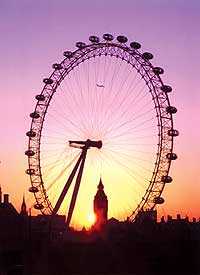 2004 is here with a bang, literally in the case of this publication, with the launch of a reformatted weekly. Will 2004 hold more hope than the year just gone by, or will our country dig an even deeper hole? I am regularly probed by Londoners about the state of Nepal. Frankly the hole couldn't be deeper for me, when I have to don the role of a chief apologist to spin and dispel the message of doom, gloom and imminent disintegration of my motherland.
2004 is here with a bang, literally in the case of this publication, with the launch of a reformatted weekly. Will 2004 hold more hope than the year just gone by, or will our country dig an even deeper hole? I am regularly probed by Londoners about the state of Nepal. Frankly the hole couldn't be deeper for me, when I have to don the role of a chief apologist to spin and dispel the message of doom, gloom and imminent disintegration of my motherland. The new year inevitably brings resolutions with many going on an overdrive with lifestyle and image overhauls. Nepal and the actors in its Greek tragedy should also adopt some resolutions. It is needed as the country's image slides further in the global PR index. Nepal has joined the banana republic league, competing with basket cases from other conflict zones. Surely we don't deserve to be in that league.
Bruising headlines and countless dedicated column inches in broadsheets bear testament to this new profile. There used to be a time when the Londoner's romanticised view of Nepal was the land of Mt Everest, white crystalline Himalayan peaks and majestic temples, subservient and brave Johhny Gurkhas, poor and placid natives ruled by an absolute feudal god king. Those images and the parodies are now so last century. Today, there is a darker picture: an ailing country suffering from aid dependency syndrome coming to terms with political seismicity and failure.
In the 21st century, the British media has a new perception of Nepal: the land of fighting (in the courts) Johnny Gurkhas, people's war and human rights atrocities, rampantly corrupt and visionless leaders, banana democracy and a realm tainted by massacre. The country has lost its innocence and its sheen, shang has long left rila, the myth is a distant memory. The country needs to change, adapt and reinvent, and the timing could not be more appropriate to stem this regression. If we don't seize this moment and traverse the high pass of peace, Nepal will be left further and further behind.
The key stakeholders in this drama have to realise there is no military solution and no going back to the discarded system of the ancien regime or to failed and selfish geriatric politicians. The gung ho army, the increasingly influential procurement agents and the military advisers have to concede that the grievances behind the conflict cannot be defeated militarily. They can only be defeated by diverting those resources being ploughed into finding a military solution.
Those Maoists with their fluid principles should probably rent another cause and migrate down south for the winter to their keeper. What do they achieve by taking the country back to Year Zero? Prolonging the struggle can only undermine the very interests and the development needs of the constituent base they allege to serve. The cause of this struggle is now in mainstream politics and the agenda of the multilateral development agencies.
Nepal has to catch the slipstream of the economic dynamism and optimism spreading in the region and present a confident and a contemporary image. Investment, tourism and development can only manifest in a nation at peace with itself. Nepal has to spiritually cleanse itself of its past misfortune by looking back at its rich tradition of tolerance, understanding and compromise.
Misogi is a traditional Shinto bathing ritual for purifying the mind and body, usually performed at the start of the year. The hour is here, Nepal and its leaders (political, RNA and PLA) should perform misogi and be agents of change. Let 2004 be a year of the Nepali renaissance.
Joti Giri is an utility professional in London.



